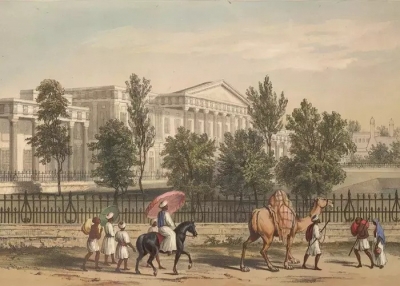Calcutta Madrasa -- a fortress of 'regressive maulvis'
By IANS | Published: March 3, 2022 12:30 PM2022-03-03T12:30:06+5:302022-03-03T12:35:17+5:30
New Delhi, March 3: Unlike the model Madrasas of Shaheen Bagh in New Delhi, where modern education combines with ...

Calcutta Madrasa -- a fortress of 'regressive maulvis'
New Delhi, March 3: Unlike the model Madrasas of Shaheen Bagh in New Delhi, where modern education combines with theological options, the Calcutta Madrasa the oldest madrasa of India, dating back to 1780, presents a grim picture of a regressive seminary. This is despite the fact that the madrasa is now serving as the Theology Faculty of the Aliah University, an autonomous university controlled by the West Bengal government.
A random visit to the madrasa shows students, male and female, intermingling, chatting on cellphones, arriving for classes on their bikes, revealing signs of any other regular campus in the country. But a closer scrutiny of the madrasa reveals a different story. In fact, the seminary is dominated by Deobandi, Nadvi clerics-teachers, many of whom are linked to Jamiat -Ulema-e-Hind, led by the powerful Madnis Arshad Madni and Mehmood Madni.
Mehmood Madni, Head of his branch of the Jamiat, attracted media spotlight recently after he announced a Rs five lakh award to the Karnataka College hijabi girl, Muskaan Khan.
This correspondent met many teachers to investigate the status of modernisation of the vintage institution. It soon became evident that instead of going with the flow, most of the faculty followed old style Deobandi-Nadwi pedagogy, deeply seeped in top-down maulvi-style cultural tradition.
Ad-hocism in the madrasa was also rampant as out of the 26 teachers, both male and female, only five held permanent positions, in the monthly pay scale of Rs 90,000 and more. Out of these five, four are Deobandis, alumni of Darul Uloom, Deoband, and one Nadwi, who had passed out from Darul Uloom Nadwa, Lucknow.
The remaining majority of 21 are only part-time teachers, working on a lowly pay scale of Rs 11,000 to Rs 14,000. These include eight female teachers. Interestingly, all part-time teachers are as qualified, if not more, than the permanent ones. But they are also mostly Deobandis, Nadwis or from madrasas linked with this background.
All these part-time teachers are afraid to talk to outsiders about the affairs of the faculty. However, Meezanur Rehman, a 45-year-old teacher hailing from South 24 Parganas, did speak openly with this correspondent. "I am highly qualified. I have degrees from many institutions like Darul Uloom Deoband, Nadwatul Ulema, Lucknow, Lucknow University, Jamia Al Azhar University, Egypt and Aligarh Muslim University. Right now, I am also pursuing a PhD from my own university, Aliah University... still I am merely a part-time teacher. There are many like me. This is because seniors (permanent ones don't like us to be promoted)," he said.
He revealed the topic of his research: Yusuf Al-Qaradawi and His Contribution to Contemporary Jurisprudence. Incidentally, the influential Egyptian theologian is known to have been part of the intellectual leadership of the Muslim Brotherhood, though he has repeatedly said that he is no longer a member of the group, which briefly assumed power in Egypt after the fall of Hosni Mubarak the former Egyptian leader in 2011.
The conversation with Meezanur Rehman also revealed that most of the research conducted in Aliah Madrasah and almost all the madrasas in India and the world revolve around personalities. While this correspondent was talking to Meezan, one of his colleagues passed by and chipped in: "This is because it's easy to encompass all theological issues while discussing lives of personalities."
Meezan said the payment to part-time teachers is Rs 250 per day and there are two classes in a day. "Overall, it totals to around Rs 14,000 per month." He also said part-time teachers with this lowly salary find it difficult to meet their family expenses in a city like Kolkata.
It also became plain that despite spending such a long time in various institutions and universities, Meezan's knowledge of English and computers was below par.
The grip of Jamiat, Deoband and Nadwa on the madrasa (faculty) became clearer when Imdad Hussain, the Head of the faculty, after some hesitation allowed this correspondent to interview two cleric-teachers: Maulana Mehmoodur Rehman and Mufti Liaqat Ali.
Mufti Liaqat is the son-in-law of powerful West Bengal Minister Siddiqullah Chowdhury, who is also the President of the Jamiat Ulema-e-Hind's West Bengal branch. He also issues fatwas, on Jamiat's letter-head.
On the question of pedagogy, Rehman said in the interview that he and other teachers taught students that scientific research only proves that Islam is a true faith and various mysteries of the nature were revealed in the Quran and Hadith in advance.
Both of them maintain that Shariah is superior to constitutional law and that any 'innovation' such as Supreme Court order on instant triple talaq, a parliamentary act on this, petition pending in SC on halala, and relaxation on hijab (complete covering of female body) is against Shariat and that they would continue to oppose it.
"We have in fact run a tehreek led by Jamiat on these issues. I issue fatwas on such issues. People come with queries, and I give them my answers in writing," said Mufti Liaqat.
(Mohammed Anas is a Delhi-based journalist, specialising on issues related to Muslim Affairs. Views expressed are personal and exclusive to India Narrative)
Disclaimer: This post has been auto-published from an agency feed without any modifications to the text and has not been reviewed by an editor
Open in app